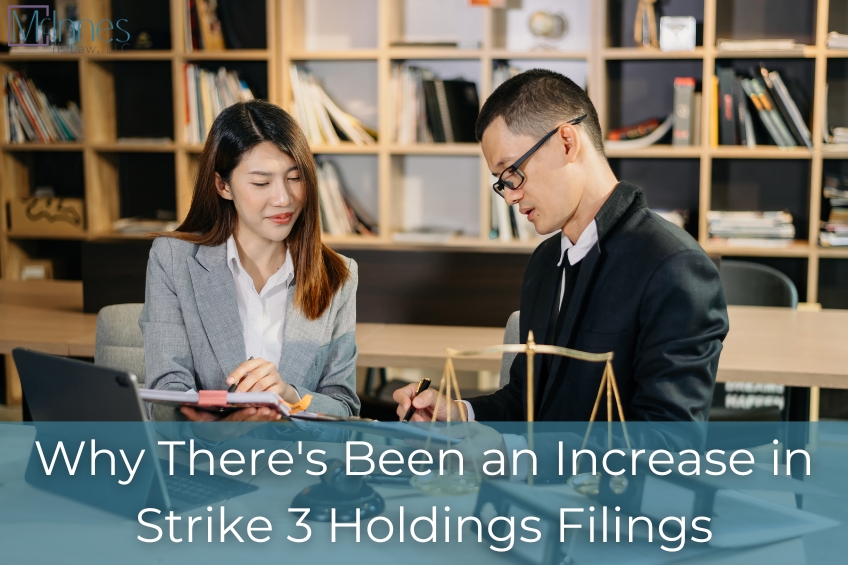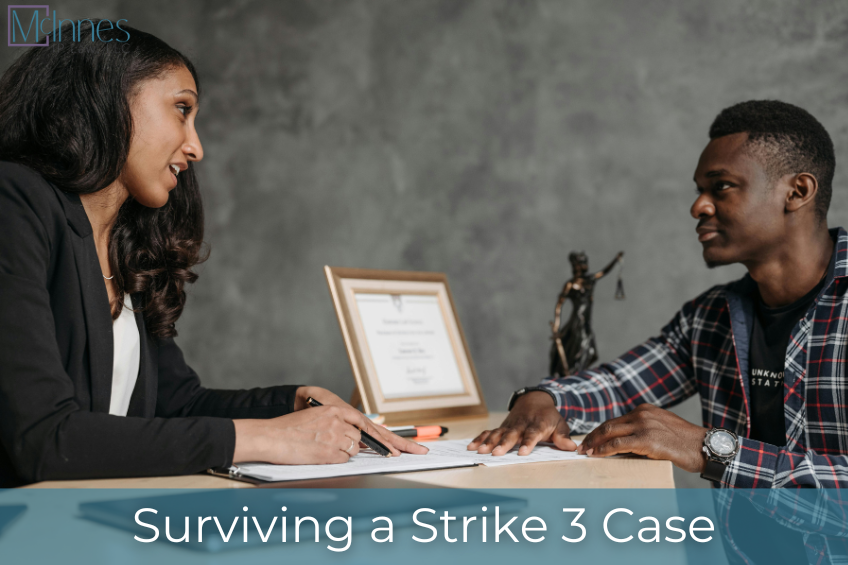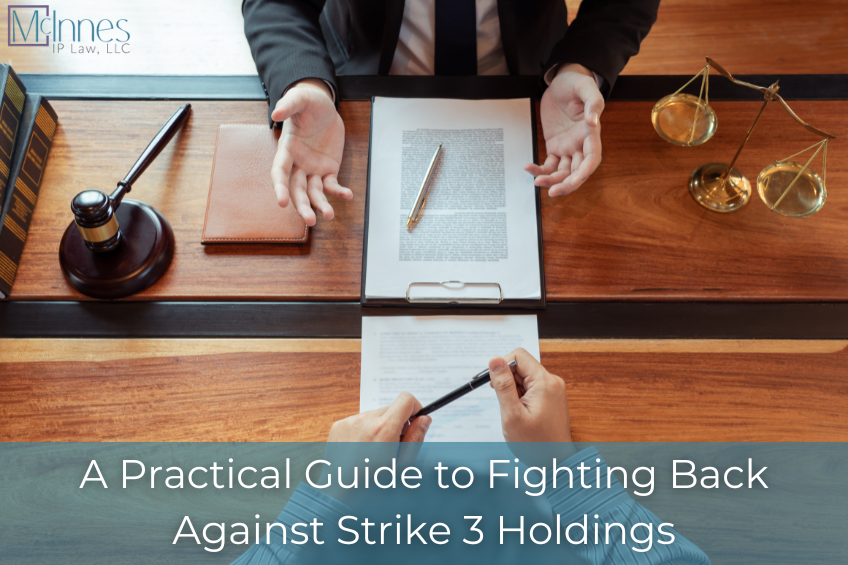Over the past year, Strike 3 Holdings, the adult-film company known for its aggressive torrent-based copyright enforcement, has significantly increased its legal activity in both state and federal courts.
This surge in Strike 3 Holdings filings signals a shift in both strategy and scale. With more lawsuits reaching federal courts across the U.S., individuals are facing increased risks of being named publicly. Understanding this evolving landscape is essential for anyone seeking to protect their privacy, rights, and financial well-being.
Whether you’re following these developments for legal, strategic, or personal reasons, here’s a breakdown of these Strike 3 Holdings filings—and why they matter.
What We’ll Cover:
- Continuing aggressive filing patterns
- Renewed push in Florida
- Notable surge in California
- What’s driving this renewed momentum?
- How courts and defendants are reacting
- What Strike 3 Holdings filings mean for you
- Why Strike 3 letters matter more than ever
- What to do if you receive a Strike 3 notice
- Key takeaways
- Legal representation
1) Continuing Aggressive Filing Patterns
Strike 3 Holdings remains one of the most active copyright enforcers in 2025, continuing its mass-volume approach to litigation. Strike 3 Holdings uses IP-tracking software—like VXN Scan and Cross Reference Tool—to detect instances of unauthorized content downloads on BitTorrent networks. Then they initiate lawsuits, naming John Doe as the defendant.
2) A Renewed Push in Florida
While Florida long served as Strike 3’s testing ground—with its state courts generating large-scale subpoenas—2025 shows continued movement in federal courts as well. PACERMonitor lists multiple new cases filed in the Middle District of Florida, including actions on May 29, 2025.
This method isn’t just a repetition of prior tactics—it’s a sign that Strike 3 is layering its approach:
- State-court discovery to identify targets
- Federal lawsuits to pursue damages and settlements
3) A Notable Surge in California—and Beyond
In late 2024, Strike 3 filed 61 new lawsuits in the Southern District of California alone, targeting individuals identified by IP address law.justia.com. This surge is a clear sign that Strike 3 is expanding beyond Florida’s previously dominant “pure bill of discovery” model to integrate heavier federal filings elsewhere.
4) What’s Driving This Renewed Momentum?
There are a few factors behind this flurry of legal activity:
File-Sharing Rebound
Usage of BitTorrent and similar protocols is on the rise again, giving Strike 3 a larger pool of targets.
Economies of Scale
Strike 3’s volume-focused litigation allows it to turn a profit even at lower settlement amounts—an assertion supported by its counsel’s statement that the model is “mostly a break-even” operation.
Strategic Shifts in Court Response
Some courts (California, Illinois, New York) have begun pushing back, questioning IP-based evidence and the intent behind discovery motions. In response, Strike 3 is doubling down in jurisdictions with high potential ROI.
Do You Need Legal Representation Against Strike 3 Holdings?
5) How Courts and Defendants Are Reacting
There are a host of legal avenues you can take to defend yourself. Here’s how the landscape around Strike 3 Holdings filings has shifted recently:
Judicial Pushback
Judges are increasingly scrutinizing Strike 3’s reliance on IP addresses alone, and the tension between personal privacy and procedural fairness has become more prominent.
Stronger Defense Tactics
Defense attorneys are stepping up—filing motions to quash subpoenas, challenging evidence reliability, and pushing back against anonymous settlement demands.
These motions, though rare, are filed in many districts. Although settlement still seems to be the chosen route for most involved in these cases.
6) What Strike 3 Holdings Filings Mean for You
If you’re targeted by Strike 3, it’s vital to understand the stakes:
- Identity Exposure: A subpoena to your ISP is a real and imminent risk of being named in federal court.
- Limited Time to Act: You often have just two weeks from the ISP notification before the identity is disclosed.
- Legal Options: You could file a motion to quash, fight evidence sufficiency, or negotiate an anonymous settlement.
What changed in 2025 is that the volume of these filings—and therefore the number of notices—is increasing noticeably.
7) Why Strike 3 Letters Matter More Than Ever
- Privacy is on the line: More cases mean more people are at risk of having their identities revealed in federal court.
- Judicial scrutiny is growing: Courts may begin tightening rules on mass discovery tactics.
- The legal landscape is shifting: You can no longer assume “they’re just looking”—the next step could be a summons naming you.
8) What to Do If You Receive a Strike 3 Notice
Don’t ignore the ISP notification. Letting the deadline pass can lead to a default judgment and severe legal consequences.
Act fast with counsel. A skilled IP defense attorney can:
- Move to quash subpoenas
- Challenge the strength of Strike 3’s evidence
- Negotiate private, anonymous resolutions
Know your rights. Courts are showing increased skepticism toward IP-only evidence. Your lawyer can leverage that momentum.
Key Takeaways
-
Strike 3 Holdings has significantly increased its filing activity in 2025, expanding federal lawsuits beyond Florida into California and other key jurisdictions.
-
The company continues using IP-tracking software to identify BitTorrent activity, followed by “John Doe” lawsuits and ISP subpoenas to unmask individuals.
-
Florida remains central to Strike 3’s strategy, but recent surges in California and other districts show a broader, multi-jurisdiction expansion.
-
Courts are beginning to scrutinize IP-only evidence more closely, and defense attorneys are filing more motions to quash and challenge discovery tactics.
-
The volume of filings means more individuals are receiving ISP notices—and facing tight deadlines to respond.
-
Once your identity is disclosed, the risk of public exposure, financial liability, and reputational harm increases substantially.
-
Ignoring a Strike 3 notice can lead to default judgments and serious legal consequences.
-
Early, strategic action with experienced legal counsel can preserve anonymity, reduce settlement exposure, and strengthen your negotiating position.
Contact McInnes IP Law for a Confidential Case Review
We’ve helped many individuals settle Strike 3 and related IP cases all over the United States. Let’s take swift and strategic action to protect your rights—and your life—before it escalates further.
We are here to protect your rights, your reputation, and your peace of mind. Call us at (774) 234-1256, email us at info@mcinnesiplaw.com, or message us on our LinkedIn Company Page.
Disclaimer: This blog is for informational purposes only and does not constitute legal advice. Every case is different. For specific guidance, consult an attorney experienced in copyright law.



